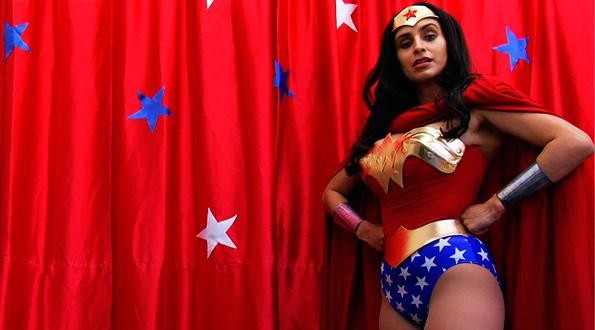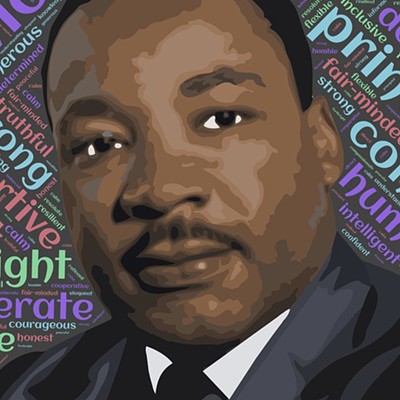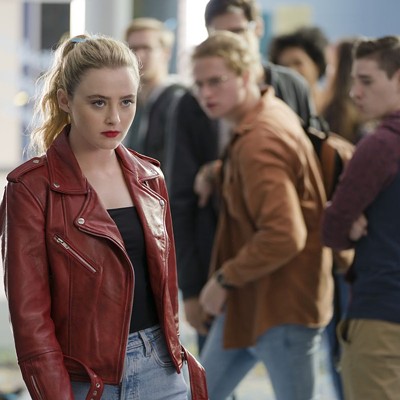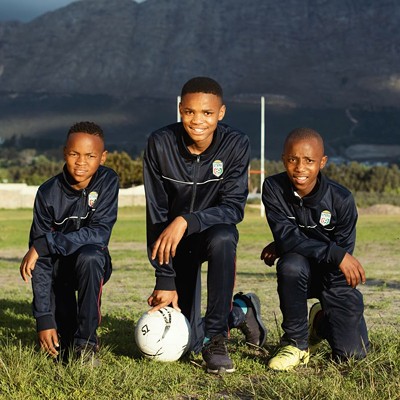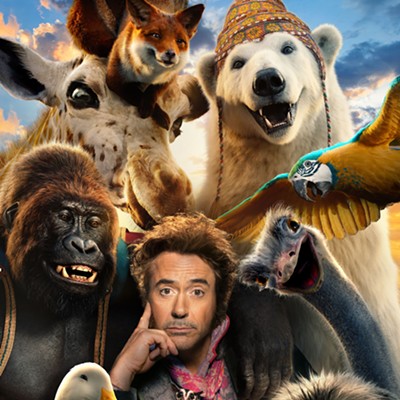The red boots. The bullet–deflecting arm cuffs. The magnanimous attitude towards all humankind.
There’s no doubt Wonder Woman is the most recognizable female superhero in American media. Ever wonder why? Because she’s the only game in town.
Think about it: Cat Woman, She–Ra, Thor Girl—they’re all sidekicks to a male lead. Wonder Woman remains the only truly feminist role model in the realm of comics and media—and has yet to be emulated in her own big screen blockbuster.
The complex history of this Amazonian icon (you’ll recall she was born Princess Diana of the all–woman Paradise island) gets a thorough examination in the documentary Wonder Women: The Untold Story of American Superheroines, screening again Friday, Nov. 2.
When psychologist and inventor William Moulten Marston went to work for DC Comics in 1941, he set out to create a strong, independent character charged with bringing sexual equality to “a world torn by the hatred of men.” Wonder Woman was a huge hit, but when WWII was over and American women vacated their new jobs to make room for the returning soldiers, her superpowers were downplayed.
She surged back into mainstream in the 70s as feminism’s Second Wave crested and has remained in the public domain, though her original mission has been seriously diluted.
Splicing interviews with Ms. magazine creator Gloria Steinem, Riot Grrl instigator Kathleen Hanna and plenty of young women expressing their demands for more superheroines, director Kristy Guevara–Flanagan presents Wonder Woman’s biography as a metaphor for women in media and in modern society. It’s an entertaining and educational look at how far we’ve come—and how far we haven’t.
Connect talked with Guevara–Flanagan from her home in Oakland, CA, where she teaches film at Diablo College and cares for her three–month old baby.
Women in the media is a theme in your work. What led you to superheroines?
Kristy Guevara–Flanagan: While working on my last film, Going on 13, I got to see first–hand how much pop culture our young people consume. I saw the kinds of images that are out there for young girls at an alarmingly younger age that they have to negotiate and deflect with their superpowers [laughs]. On one hand, it’s like candy, on the other, it can leave them with a lot of limiting choices.
So I was thinking about pop culture, I was thinking about media literacy. I teach college students, and there’s a real gender disparity in my classroom with technology and leadership with the young women. Some of them are too freaked out to even hold a camera. It was a real surprise that these clichÉs and stereotypes are still embedded in their lives. You have to push hard to get them to think around them.
Your film shows that the Wonder Woman character was created in the 1940s as “psychological propaganda in preparation for the kind of women who would soon be running the world,” yet we all know how far away we are from that. What does she represent now?
Kristy Guevara–Flanagan: The whole contradiction of Wonder Women is so interesting and provocative. She was definitely created as a very idealistic concept. When her creator, William Moulten Marston, passed away, the whole thing was watered down. We do still associate her with power and empowerment, but it’s almost just an emblem on a t–shirt. People don’t really understand.
It’s the only image we have when we want to use that metaphor for the strong woman. She’s it.
In the 80s, we saw Terminator 2’s Linda Hamilton and her biceps and Sigourney Weaver wielding machine guns in Aliens. Where are the badass women of this generation?
Kristy Guevara–Flanagan: I can’t think of anyone else who has that iconic of a stature. There was Buffy, who’s already over 15 years old, and she didn’t have that overt physical strength. It’ll be interesting to see if Katniss of The Hunger Games rises to become a strong complex female figure. And there’s Lisbeth from the Girl with the Dragon Tattoo…but wow, is she damaged. It’s this horrible revenge rape story line.
In your film, Kathleen Hanna of Bikini Kill laments how “girl power” was co–opted by the Spice Girls. How do we prevent the concept of female power from being trivialized and cutened up?
Kristy Guevara–Flanagan: That’s the challenge, right? Well, you have to have hope. Sometimes I feel completely despondent about it. But I think by really training our children—both girls and boys—to be media literate, to ask questions and analyze so that they can recognize stereotypes. When they become a more educated audience, they’ll crave and want something more nuanced rather than these flat images.
I also think we need to support women creators—go out and see the films directed by women or those that have strong female leads. And we need to demand more from those in charge. Maybe not in Hollywood, but interesting things happen at comic conventions when DC or Marvel kills off one of its female characters and people speak out. It’s created some real change in those industries.
Most importantly, we need to start training ourselves to make our own media. We have the technology.
Should we riot because they’ve hired a man to write the screenplay for an upcoming Wonder Woman blockbuster?
Kristy Guevara–Flanagan: [laughs] Yeah, yeah…we’ll see if that even happens. That concept has gotten started then fallen by the wayside repeatedly.
You end your film with a shot of Oscar–winning Hurt Locker director Katherine Bigelow. Why?
Kristy Guevara–Flanagan: Because we need to support women as directors and in these colorful positions in the media and recognize how seldom this happens. In certain areas women have made great gains, but it the arenas where it really matter—business, politics and media—the dearth is still proportionately outrageous. We need to cultivate girls rising to be leaders in all of these areas.
How will your work change now that you have a daughter?
Kristy Guevara–Flanagan: It’s interesting. I found out her gender while I was pregnant so it’s something I’ve been thinking about for a while. I’m really wanting to build the world I want my daughter to live. I realize that the gender typecasting starts at a very young age. Like immediately. Seeing all the pink and blue stuff...
I’ve been really aware of wanting to resist the gender stereotypes in a healthy way. Having a baby has been a huge change in my identity—caring for her, finding time for some work—I had always respected moms, but now, whoa.
Gives a lot more meaning to the term Wonder Woman.
Kristy Guevara–Flanagan: It does!
Next project?
Kristy Guevara–Flanagan: I’m going to be working on the outreach of Wonder Women for a while. We’re also trying to raise money for a game concept. I couldn’t include much about the gaming industry in my film, but that community is of great interest to me since games are what our youth are playing every day. And wow, talk about some pretty abysmal representations of women.
We want to make a game called Wonder City that more of a social issue behind it. Players would embody a female superhero, create a secret identity and have to make decisions about how to rule the world.
Sounds so much more awesome than killing zombies.
Kristy Guevara–Flanagan: Yes, it’s about embracing your own superhero and identifying your own leadership skills. We want to create media that nurtures that.
Wonder Women: The Untold Story of American Superheroines screens Friday, Nov. 2 at 9:30 a.m. at the Lucas Theatre.

